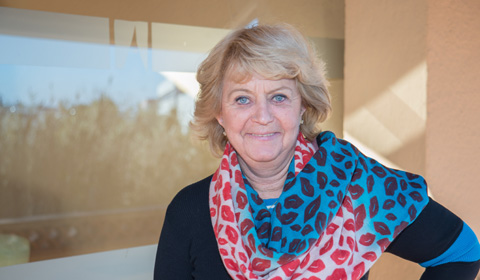"In gender equality we have many arguments in our favour; now it is time to actually make policy"

21/01/2016
1- You were a member of the Bureau of European Policy Advisers, a body within the European Commission that advised its presidents, from 2005 to 2014. Did you achieve your objectives in that time?
Well, my objectives are always very ambitious so perhaps they are hard to achieve for that reason. But from the time I was working with President José Manuel Barroso I am happy about certain small successes, though his closest advisors always thought that equality was a secondary concern, less important than others. I am happy about small achievements, like the fact that there are now more women advisors, the creation of the European Institute for Gender Equality, or the Gender Equality Index. But it has been impossible to increase the impact of the gender perspective on European policy to deal with the crisis. Unfortunately, the European commissioners did not believe in it deeply enough.
2- What is the importance of this conference taking place at the UAB on the EGERA project for gender equality in Europe?
It is significant that eight universities, with different governing structures and ways of operating, have come to an agreement to promote gender equality. They are all different but they do have that in common. Bear in mind that progress among teaching staff and what we call "academia" is very very slow. Much work needs to be done to make many changes.
3.- What are the main challenges facing the European Union in matters of gender equality?
The biggest one is that of real policy-making. We may have hundreds of arguments to support the idea that gender equality is highly positive for society, but what we find when it comes to actual policy-making is that this goes unseen. The policy-makers are not really convinced by the arguments: this is apparent from the decisions they make.
4.- In most universities, including this one, there are more women students than men, except in the engineering degrees. And women perform better academically than men, but in the teaching staff men are in the majority and the same goes for project leaders or heads of government. What is happening here? How do we solve this?
This is precisely the aim of projects like EGERA. Currently there are 11 research projects in European universities looking to change university structures to solve this problem. There are more women PhD students than men! And the human capital of women must be used efficiently: this is very important for society.
5.- Could you make a comparison between universities in different countries from a gender perspective?
In Scandinavian universities there is a gender culture and a gender policy. In southern countries like Spain, which is a clear example, the amount of progress has a lot to do with social movements and women's struggle to make advances in gender equality. Here it depends on social mobilisation, as the culture is not as strong as in Scandinavian countries.
6. Why are policies on gender equality so important if we want Europe to be competitive?
The first reason would be in order to make better use of human resources: women are intelligent, they are better trained, they are doing PhDs, getting good academic results, etc. If you need to make use of human capital, you need the mind of a woman!
Secondly, because it is important to have a woman's vision alongside that of a man's, when doing research for example. We need both visions. The research is much richer if we have both visions, both approaches.
For instance, when I was in the European Commission, one day the European Commissioner for research used Ada Lovelace, Lord Byron's daughter, as an example.
7. Ada Lovelace? What happened to her?
Well, her mother pushed her towards mathematics and science, so that she wouldn't devote herself to poetry and literature like her father, the poet Lord Byron, who the mother resented because he had left her. And Ada Lovelace turned out to be a mathematical genius: she invented the first programming language in history! But in those days women were invisible, and all the research she did was attributed to her partner Charles Babbage, the one who publicised it. If women had been more visible and valued at that time, today's digital society would surely have arrived 40 or 50 years earlier!
8. What conclusions do you draw from this?
-That women and men are different, obviously, but it is necessary to have the vision of both of them in all areas of knowledge. In the field of biology or medicine this can be seen very clearly: the needs of a woman's body and those of a man, for example, are different, and they must be kept in mind when thinking about what direction a research project should take. This is why it is so important for both men and women to be in research, as society is made up of both.